Hyundai IONIQ 5 vs Nissan Leaf - Differences and prices compared
Costs and Efficiency:
Price and efficiency are key factors when choosing a car – and this is often where the real differences emerge.
Nissan Leaf has a noticeable advantage in terms of price – it starts at 30800 £, while the Hyundai IONIQ 5 costs 38500 £. That’s a price difference of around 7714 £.
In terms of energy consumption, the advantage goes to the Hyundai IONIQ 5: with 15.60 kWh per 100 km, it’s hardly perceptible more efficient than the Nissan Leaf with 16.70 kWh. That’s a difference of about 1.10 kWh.
As for range, the Hyundai IONIQ 5 performs distinct better – achieving up to 570 km, about 185 km more than the Nissan Leaf.
Engine and Performance:
Under the bonnet, it becomes clear which model is tuned for sportiness and which one takes the lead when you hit the accelerator.
When it comes to engine power, the Hyundai IONIQ 5 has a significantly edge – offering 650 HP compared to 217 HP. That’s roughly 433 HP more horsepower.
In acceleration from 0 to 100 km/h, the Hyundai IONIQ 5 is convincingly quicker – completing the sprint in 3.50 s, while the Nissan Leaf takes 6.90 s. That’s about 3.40 s faster.
In terms of top speed, the Hyundai IONIQ 5 performs clearly perceptible better – reaching 260 km/h, while the Nissan Leaf tops out at 157 km/h. The difference is around 103 km/h.
There’s also a difference in torque: Hyundai IONIQ 5 pulls significantly stronger with 770 Nm compared to 340 Nm. That’s about 430 Nm difference.
Space and Everyday Use:
Beyond pure performance, interior space and usability matter most in daily life. This is where you see which car is more practical and versatile.
Seats: offers more seating capacity – vs .
In curb weight, Nissan Leaf is clearly perceptible lighter – 1580 kg compared to 1955 kg. The difference is around 375 kg.
In terms of boot space, the Hyundai IONIQ 5 offers distinct more room – 520 L compared to 394 L. That’s a difference of about 126 L.
In maximum load capacity, the Hyundai IONIQ 5 performs convincingly better – up to 1580 L, which is about 790 L more than the Nissan Leaf.
When it comes to payload, Hyundai IONIQ 5 clearly perceptible takes the win – 530 kg compared to 415 kg. That’s a difference of about 115 kg.
Who wins the race?
The Hyundai IONIQ 5 proves to be outperforms in nearly all aspects and therefore becomes our DriveDuel Champion!
Hyundai IONIQ 5 is the better all-rounder in this comparison.
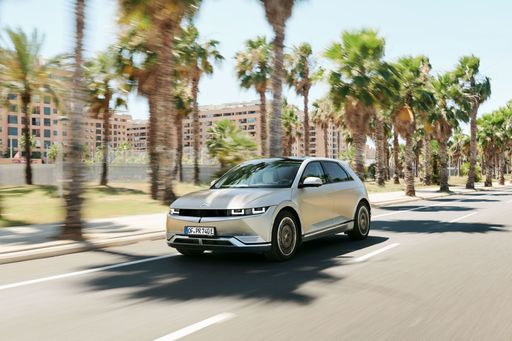 @ Hyundai Motor Company
@ Hyundai Motor Company
Hyundai IONIQ 5
Costs and Consumption
View detailed analysis
Engine and Performance
View detailed analysis
Dimensions and Body
View detailed analysis
Hyundai IONIQ 5
The Hyundai IONIQ 5 looks like a spaceship that moved into suburbia, pairing bold retro‑futuristic styling with a roomy, cleverly laid-out cabin that makes long trips surprisingly comfortable. Its electric character delivers instant, silky acceleration and low running costs, making it a smart, slightly cheeky pick for buyers who want tech, practicality and personality without the drama.
details @ Hyundai Motor Company
@ Hyundai Motor Company
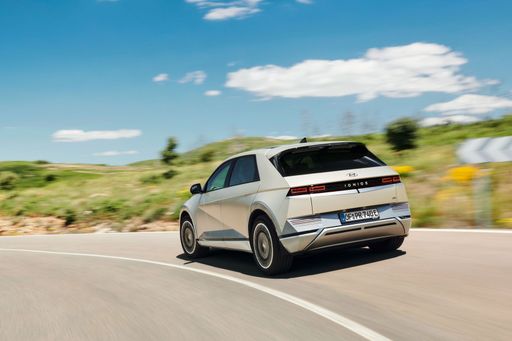 @ Hyundai Motor Company
@ Hyundai Motor Company
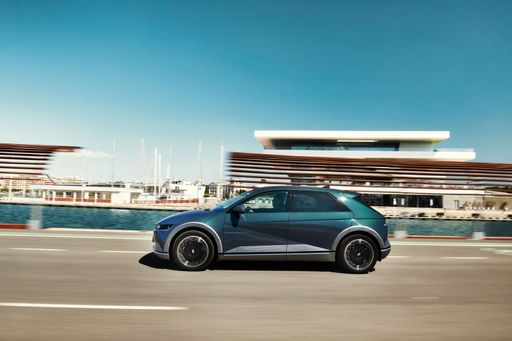 @ Hyundai Motor Company
@ Hyundai Motor Company
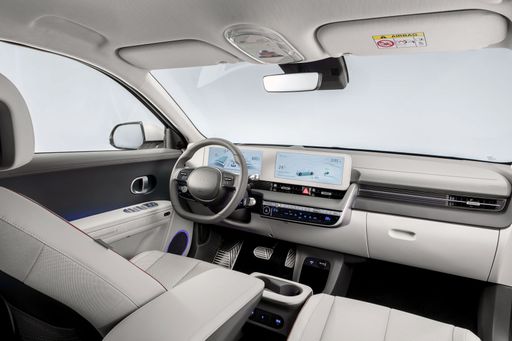 @ Hyundai Motor Company
@ Hyundai Motor Company
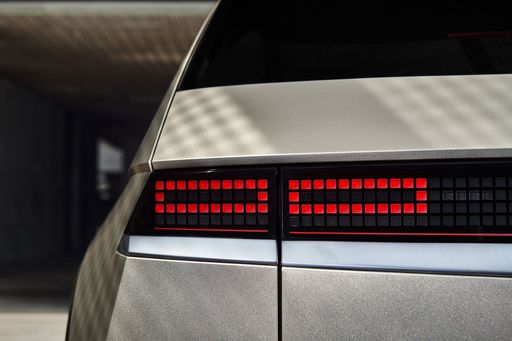 @ Hyundai Motor Company
@ Hyundai Motor Company
Nissan Leaf
The Nissan Leaf is a practical, easygoing electric hatch that turns daily commutes into a quiet, effortless affair while offering more cabin space than it lets on. It’s a sensible, wallet-friendly step into electrification for buyers who value comfort and simplicity over sporty drama, though those chasing long-distance thrills might look elsewhere.
details @ Nissan Motor Corporation
@ Nissan Motor Corporation
 @ Nissan Motor Corporation
@ Nissan Motor Corporation
 @ Nissan Motor Corporation
@ Nissan Motor Corporation
 @ Nissan Motor Corporation
@ Nissan Motor Corporation
 @ Hyundai Motor Company
@ Hyundai Motor Company
|
 @ Nissan Motor Corporation
@ Nissan Motor Corporation
|
|
|
|
Costs and Consumption |
|
|---|---|
|
Price
38500 - 64200 £
|
Price
30800 - 37200 £
|
|
Consumption L/100km
-
|
Consumption L/100km
-
|
|
Consumption kWh/100km
15.6 - 21.2 kWh
|
Consumption kWh/100km
16.7 - 17.8 kWh
|
|
Electric Range
440 - 570 km
|
Electric Range
270 - 385 km
|
|
Battery Capacity
63 - 84 kWh
|
Battery Capacity
39 - 59 kWh
|
|
co2
0 g/km
|
co2
0 g/km
|
|
Fuel tank capacity
-
|
Fuel tank capacity
-
|
Dimensions and Body |
|
|---|---|
|
Body Type
SUV
|
Body Type
Hatchback
|
|
Seats
5
|
Seats
5
|
|
Doors
5
|
Doors
5
|
|
Curb weight
1955 - 2275 kg
|
Curb weight
1580 - 1756 kg
|
|
Trunk capacity
480 - 520 L
|
Trunk capacity
385 - 394 L
|
|
Length
4655 - 4715 mm
|
Length
4490 mm
|
|
Width
1890 - 1940 mm
|
Width
1788 mm
|
|
Height
1585 - 1605 mm
|
Height
1540 - 1545 mm
|
|
Max trunk capacity
1540 - 1580 L
|
Max trunk capacity
790 L
|
|
Payload
385 - 530 kg
|
Payload
384 - 415 kg
|
Engine and Performance |
|
|---|---|
|
Engine Type
Electric
|
Engine Type
Electric
|
|
Transmission
Automatic
|
Transmission
Automatic
|
|
Transmission Detail
Reduction Gearbox
|
Transmission Detail
Reduction Gearbox
|
|
Drive Type
Rear-Wheel Drive, All-Wheel Drive
|
Drive Type
Front-Wheel Drive
|
|
Power HP
170 - 650 HP
|
Power HP
150 - 217 HP
|
|
Acceleration 0-100km/h
3.5 - 8.5 s
|
Acceleration 0-100km/h
6.9 - 7.9 s
|
|
Max Speed
185 - 260 km/h
|
Max Speed
144 - 157 km/h
|
|
Torque
350 - 770 Nm
|
Torque
320 - 340 Nm
|
|
Number of Cylinders
-
|
Number of Cylinders
-
|
|
Power kW
125 - 478 kW
|
Power kW
110 - 160 kW
|
|
Engine capacity
-
|
Engine capacity
-
|
General |
|
|---|---|
|
Model Year
2024 - 2025
|
Model Year
2019
|
|
CO2 Efficiency Class
A
|
CO2 Efficiency Class
A
|
|
Brand
Hyundai
|
Brand
Nissan
|
What drive types are available for the Hyundai IONIQ 5?
The Hyundai IONIQ 5 is available as Rear-Wheel Drive or All-Wheel Drive.
The prices and data displayed are estimates based on German list prices and may vary by country. This information is not legally binding.
